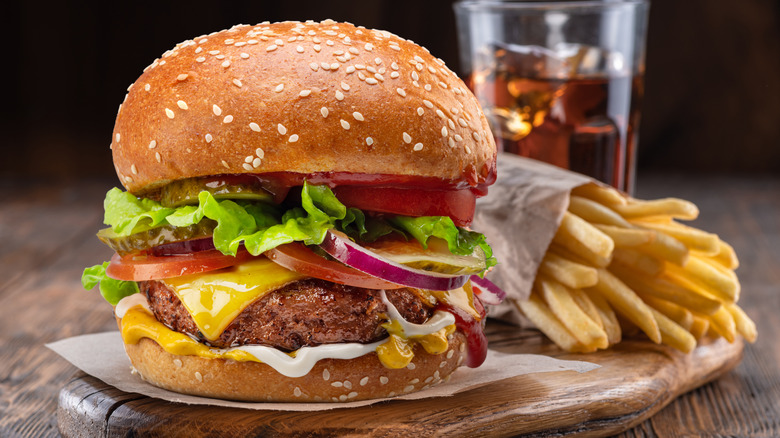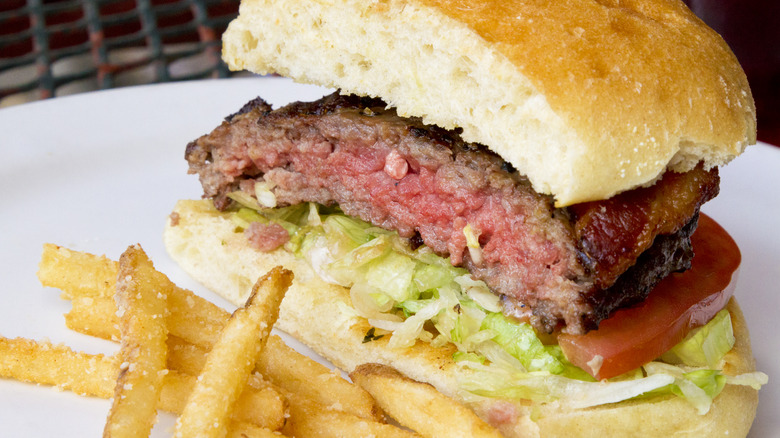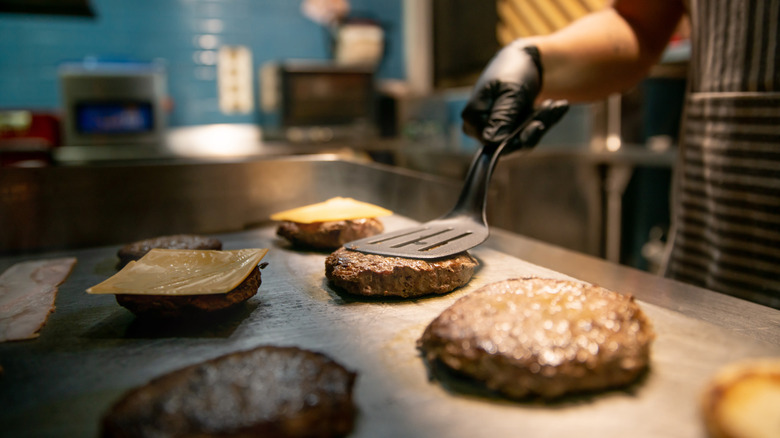It's A Huge Mistake To Order Restaurant Burgers Medium-Rare
Food poisoning is no joke. According to the CDC, the foods that are most likely to make you sick are often consumed raw or undercooked: including meat, poultry, eggs, seafood, and unpasteurized milk; and even raw fruits, vegetables, and grains, if you aren't careful. While a medium-rare burger or raw cookie dough might taste delicious, they're not worth the pain and suffering that can ensue if you get food poisoning.
Following the best food safety practices can help you avoid food poisoning, such as keeping your refrigerator at the correct temperature and staying away from storing cooked food on the counter for more than two hours. However, when you eat out, you're at the mercy of the restaurant. This is why ordering medium-rare burgers when you're dining out can be a big mistake. Not only are medium-rare burgers often cooked to a lower temperature than what is recommended by the CDC and the FDA, but many restaurants also don't follow the best food safety practices, which can lead to contamination and food poisoning.
Why ordering medium-rare burgers may be unsafe
Many people think the doneness of a burger is determined by the color. However, it's best for restaurants to use internal temperature to determine this. According to Webstaurant Store: Rare burgers are cooked to 120 to 125 degrees Fahrenheit, medium-rare burgers are cooked to 130 to 135 degrees, medium burgers are cooked to 140 to 145 degrees, medium-well burgers are cooked to 150 to 155 degrees, and well-done burgers are cooked over 160 degrees. The FDA food code recommends that restaurants cook ground beef to 155 degrees for 15 seconds. Anything cooked to a lower temperature (i.e. rare, medium-rare, and even medium burgers) could potentially be unsafe.
This risk is compounded by the fact that many restaurant kitchens don't always follow the best food safety practices. According to a CDC study in 2013 that monitored the food handling in 385 restaurants, 53% of restaurants had at least two risky ground beef handling practices. Some of the unsafe practices observed in the study included not using internal temperature to measure doneness, cross-contamination, and not requiring employees to notify managers when gastrointestinal illness symptoms are reported. The study found risky practices in all types of restaurants, but they were observed more frequently in independently-owned restaurants than in chain restaurants. When meat isn't cooked to a high enough temperature and cross-contamination occurs, you're more likely to contract foodborne illness.
How to reduce the risk of food poisoning when eating out
Germs and foodborne illnesses that are commonly transported via raw or undercooked beef include Salmonella, E. Coli, and Yersinia. If you want to reduce your chances of getting sick while eating a hamburger from a restaurant, it's best to order your burger medium-well or well-done. You can also ask the restaurant if they use irradiated ground beef. The risk of contracting a foodborne illness may be lower when eating irradiated ground beef because it's treated to kill germs.
You can also check the restaurant's inspection score by going to your state's health department website or asking the restaurant for a copy of the inspection report. This can give you a better idea of the restaurant's food handling practices. Additional ways to prevent getting ill include looking for food safety training certificates and looking for safe food handling practices, such as washing hands and wearing gloves. If the restaurant checks all the boxes and you really want that medium-rare burger, it might be safe to eat. If, however, you notice that workers aren't washing their hands or that the restaurant doesn't have a copy of their inspection report available, it might be best to err on the side of caution and order a well-done burger.


